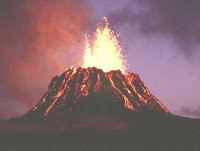In 1859, a coronal mass ejection caused telegraph lines to burst into flame. Since that was the extent of high tech communication in those days, nothing else really happened when the sun rained unruly protons and electrons on the planet. Protected by Earth’s magnetic field, most people didn’t notice anything but an unusually strong aurora borealis.
Cosmologically speaking, these solar storms are not unusual. In fact, another CME is predicted. This time, more than telegraphs will be affected. Our power-based infrastructure, from electricity to communications, is dependent on satellites and power grids which could black out when the sun "ejects" again. Scientists warn that the world could be catastrophically disabled for months.
No lights. No television. No refrigerators or cell phones. I picture myself cowering in a closet as gun-toting, survivalist extremists plunder the city.
How do I know about this?
I spend many an evening relaxing to documentaries on the Discovery, History, and National Geographic channels.
Occasionally opting for educational programming over brainless entertainment, I sit riveted to the screen as scientists describe in detail how the world could come to an end. Volcanoes, asteroids, viral pandemics killing tens of millions: all are inevitable and have the potential to, if not end life, change it forever.
Usually, about 40 minutes into each program, the somber narrator says, "It's not a matter of if this will happen. It's a matter of when."
I don't need distortion from FOX News to make me worry. I don't need Nostradamus or predictions about "2012" to cause anxiety about the future. For that, I rely on actual science, graphically broadcast through cable TV.
Sometimes I think we know more than we ought to. In the time before mass communication, our worries were limited to more local problems. News was what you learned of your neighbor while visiting the general store. Of course our ancestors lived with anxiety too. Starvation, for example, was just one crop failure away for many of them.
But do I really need to know that the super volcano at Yellowstone blows up every few hundred thousand years, plunging the world into darkness and leading to the extinction of species? It could happen tomorrow or in 50,000 years. But it will happen. There is not a thing we can do about it.
Geologically speaking, the asteroid that wiped out the dinosaurs was not that unusual. It's only a matter of time before another random object from Space crosses our orbit with the same effect as thousands of nuclear bombs.
Smaller disasters aren’t much better to contemplate.
The Cascadian Slip Fault, just off the coast of Oregon and Washington, gives way every few centuries. The last time it happened was in 1700 according to carbon dating at the site and also records of a related tsunami in Japan. The next time, a 9.0 earthquake and accompanying ocean waves will wreak havoc in the great northwest.
And we all know that one of these days, California will be leveled by "the big one" – a long predicted earthquake the length of the San Andreas Fault.
Tragic as they are, hurricanes are small fry. That volcano in Iceland causing some inconvenience in Europe is a pipsqueak. Floods? Blizzards? Climate change? We should be so lucky.
Hmm. I wonder what will happen on Idol this week.
Wednesday, April 21, 2010
Subscribe to:
Post Comments (Atom)


No comments:
Post a Comment